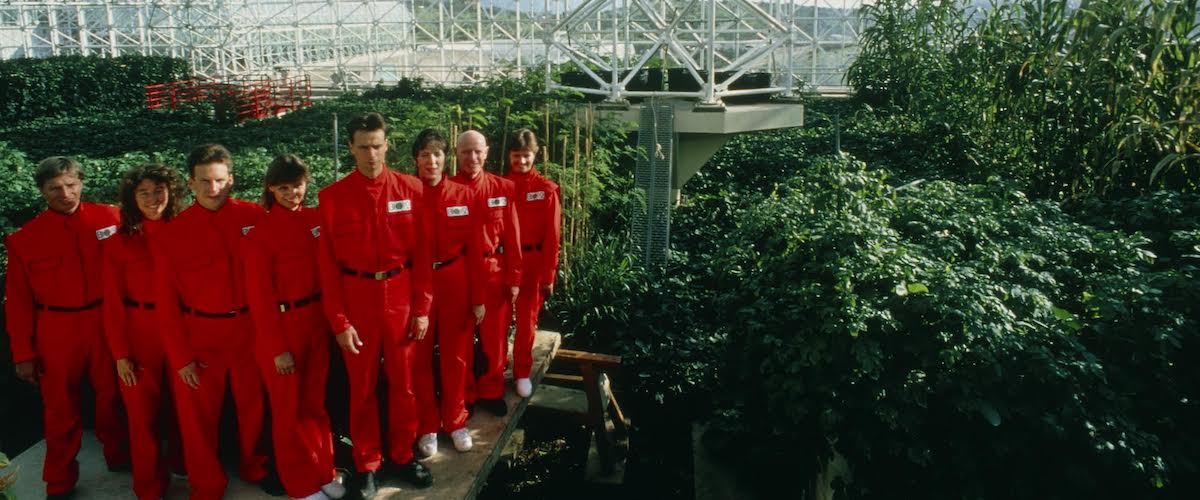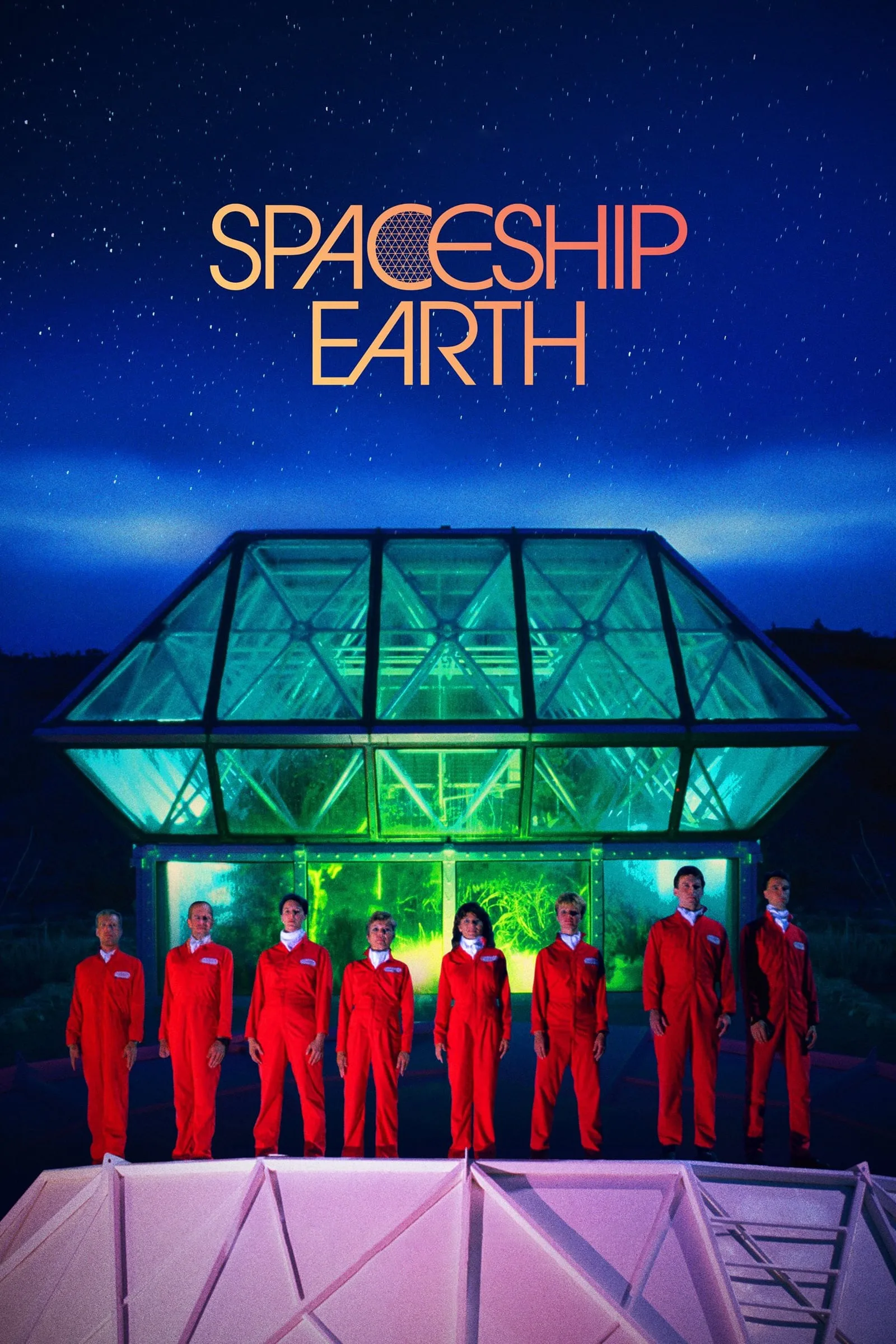“Spaceship Earth,” about a group of explorers locking themselves into a man-made, self-sustaining ecosystem for two years in the early 1990s, is a model of documentary craft, showcasing mainstream narrative nonfiction at its apex. As cinema, it’s not trying to reinvent any wheels. But it’s an impressive example of basic storytelling techniques refined for maximum impact, each element reinforcing and feeding off every other element, as in the enclosed ecosystem that it depicts.
Directed by Matt Wolf, the movie draws on an impressive archive of never-before-seen footage from the inside of Biosphere 2, an Arizona-based “system science research project” that re-created the earth’s dominant climates on a miniature scale (including a rainforest, a desert, plains and an ocean with reefs) and included enough animals, birds and insects to theoretically keep life humming along without infusions of materials or elements from outside. Solar power and natural gas provided energy. Funded by billionaire Ed Bass and supervised by systems ecologist, engineer, metallurgist, and impresario John P. Allen, the project was essentially a land-bound Noah’s Ark, meant to help humans understand their own existing, organic ecology while testing an artificial version that could be used in space colonies.
Allen is the nucleus of everything. Genial and openhearted, but with a grin that suggests he might be up to something, he’s the sort of man who might look equally comfortable three-piece suit addressing a Fortune 500 company’s shareholders or wearing a sequined tuxedo and top hat while riding a unicycle in a circus. The other participants in the Biosphere project—including staffers, designers, PR people, and the “explorers” who went inside—describe him with genuine love and respect, not just because he guided them in a grand experiment, but because he made the training program such fun. As participant Mark Nelson puts it, Allen was a “mind musician.” He unlocked creativity through thought experiments and playacting exercises derived from stage training, and realized that, underneath it all, “everything is theater.” True to that philosophy, the crew is often shown in home videos of amateur theatrical rituals and full-fledged productions. Among the latter: a quasi-psychedelic musical, performed just prior to entering the biosphere, in which the performers envision all the things that could go wrong, as if trying to exorcise bad mojo ahead of time.
Once the explorers went inside, things got messy. As expected—but perhaps to a greater degree than anyone foresaw—some of the ecological projections and prototypes didn’t work. Nearly all of the vertebrate mammals and birds inside the Biosphere died, along with most of the insect species, save for one species of ants and, of course, cockroaches. And there were points where both the artificial ecosystem of the Biosphere and the emotional ecosystem of its human crew faltered profoundly enough to require intervention, from an oxygen shortage that required outside infusions to prevent suffocation, to pressure-cooker factionalism that split the crew into warring halves. There were also political pressures from outside, including protests over the lack of black crewmembers (a valid complaint considering how the PR team trumpeted their “diverse” group of internationally diverse but all-white explorers), accusations that the project misrepresented its ability to manage CO2 under the dome, and further complaints that the Biosphere group was practicing New Age pseudoscience that had more to do with cult dynamics than research.
Within minutes of entering the story, you understand why some media outlets sought to portray Allen as a cult leader, Bass as a James Bond villain building his own private Eden in the desert, and Biosphere 2 as an end-of-the-world fantasy come to life. Both Allen and most of the crew were shaped by counterculture sensibilities and were thus out-of-step with America in the post-Reagan era, a reactionary, pro-capitalist period of US history. The core of the Biosphere team came out of Northern California in the late 1960s, and all were shaped by the then-protean environmental activist movement and concerns about pollution, overpopulation, species extinction, and shrinking resources. Wolf’s film explores all of this while also correcting the record, and it does it simply by spending time with the people who were there, letting us hear what they have to say and showing us video of what they actually did.
Above and beyond anything else, this was an experiment, and experiments by definition aren’t plans that have to be executed perfectly or be deemed failures. The entire point of an experiment is to experiment. You make notes of what worked and what didn’t, and try to figure out what’s knowable and true versus what’s mysterious or false.With hindsight, the project looks like a success, gathering two years’ worth of data showing what happens when you try to replicate a version of the Earth on a comparatively tiny scale. The coral reefs did well, the savannah persisted, the rainforest endured despite some problems, and throughout the two-year effort, the crew discovered all sorts of things about life on earth that might not have been apparent otherwise. The project was repeated again in 1993, this time for a few months, and Biosphere in now under the control of the University of Arizona.
The film is helped greatly by telling a story that hasn’t already been covered to death. Along the way, it incidentally hands audiences a new metaphor for, well, pretty much everything — which might’ve been one small part of Allen’s original intent, considering these pioneers were essentially building and inhabiting a huge metaphor anyway.
Available on VOD today, 5/8.




















